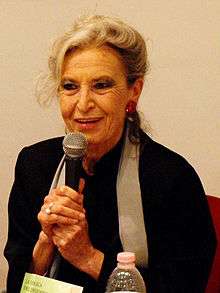Barbara Alberti
| Barbara Alberti | |
|---|---|
 | |
| Born |
April 11, 1943 Umbertide, Perugia, Umbria, Italy |
| Occupation | Writer, journalist, screenwriter |
| Website | barbaraalberti.it |
Barbara Alberti (born April 11, 1943, in Umbertide) is an Italian writer, journalist, and screenwriter.
Early life and education
Alberti grew up in a poor family and received a Catholic education.[1] When she was 15, her family moved to Rome. Although Alberti said that she hated the city at first sight, she eventually warmed up to it. She attended Rome's University and took a degree in philosophy.
Work
In her eclectic production, which aims to fight loser of the feminine image, there are also different works, from the picaresque evil Memorie Malvagie (1976) to the meditative Vangelo secondo Maria (1979), a stronger work tinged with humor and provocation suchas Il signore è sevito (1983), Povera bambina (1988), Parliamo d'amore (1989), Delirio e Gianna Nannini from Siena, both from 1991, and Il promesso sposo (1994), a profile dedicated to the art critic Vittorio Sgarbi and presented in the guise of a "fake" autobiography.
As a kind of humor is 'La donna è un animale stravagante davvero: ottanta ritratti ingiusti e capricciosi' (1998), in which Alberti was an Don Giovanni imaginary beside some female figures notes of her generation. The protagonists of her novels launch all the same challenge: to find the most invisible among happiness. Creatures in revolt: injudicious old, children of hell, hell, saints. Come back often the religious argument. In the past decade has been passionate about the fantastic biographies of existing characters, living and dead.
In 2003, Alberti published Gelosa di Mayakovsky, the biography of the famous poet (for which, in the same year, she was awarded the Alghero Woman Prize, and The Prince's Steering Wheel, in which she told with malice and loving the life of Antoine de Saint-Exupéry. In 2006 she authored a book of short stories about husbands returning home.
She is also the author of many screenplays, including "Anche gli angeli mangiano fagioli" (1973), Il portiere di notte[2] (1974) and Melissa P. (2005), as well as playwrights (Ecce Homo).[3]
Since 2009, she has held a pungent weekly column, "La posta di Barbara Alberti" in Il Fatto Quotidiano.[4]
Alberti also worked as commentator and pundit on several television talk shows, including Pomeriggio 5, Italia sul 2 and La guardiana del faro[5], a weekly program aired on Sunday mornings from 9:00 to 10:00 on Radio 24.
Personal life
Alberti was married to producer and screenwriter Amedeo Pagani.[6] They have two children, Gloria Samuela, or Sami (1966) and Malcolm (1975). Pagani and Alberti were married three times: They first got married in London to please her father, then in the Abbey of Casamari in Ciociaria to please Pagani's mother as she did not know that about the wedding in London, and for a third and last time "in the house of Ananias grandfather, my father's father, with lots of dancing on the threshing floor." Pagani left Alberti in the 1980s for Elisabetta Billi but eventually returned to her fifteen years later because of the children. They never officially divorced and Alberti now refers to him as "then-husband, now a dear relative".
Literary works
- Riprendetevi la faccia, Mondadori (2010)
- Il ritorno dei mariti, Mondadori (2006)
- Il Principe Volante, Playground (2004)
- Gelosa di Majakovskij, Marsilio (1994)
- Il promesso sposo (a biography of Vittorio Sgarbi), Edoardo Sonzogno (1994)
- Vocabolario d'amore, Rizzoli (1994)
- La donna è un animale stravagante davvero, Frontiera Edizioni (1994)
- Gianna Nannini da Siena (a biography of Gianna Nannini), Mondadori (1991)
- Parliamo d'amore, Mondadori (1989)
- Dispetti divini, Marsilio (1989)
- Povera bambina, Mondadori (1987)
- Tahiti Bill, Mondadori (1985)
- Buonanotte Angelo, Mondadori (1985)
- Scometto di sì, Mondadori (1984)
- Fulmini, Spirali, (1984)
- Il signore è servito, Mondadori (1983)
- Sbrigati mama, Mondadori (1983)
- Donna di piacere, Mondadori (1980)
- Vangelo secondo Maria,[7] Mondadori (1978)
- Delirio,[8] Mondadori (1977)
- Memorie malvage,[9] Marsilio (1976)
Filmography
- Misunderstood, directed by Asia Argento (2014)
- Io sono l'amore, directed by Luca Guadagnino (2009)
- Melissa P., directed by Luca Guadagnino (2005)
- Monella, directed by Tinto Brass (1998)
- Donna di piacere, directed by Paolo Quaregna (1997)
- Angeli a sud, directed by Massimo Scaglione (1992)
- Una donna allo specchio, directed by Paolo Quaregna (1984)
- La disubbidienza, directed by Aldo Lado (1981)
- Io sto con gli ippopotami, directed by Italo Zingarelli (1979)
- Ernesto, directed by Salvatore Samperi (1979)
- Mimì Bluette... fiore del mio giardino, directed by Carlo Di Palma (1977)
- Pensione paura, directed by Francesco Barilli (1977)
- Qui comincia l'avventura, directed by Carlo Di Palma (1975)
- Colpita da improvviso benessere, directed by Franco Giraldi (1975)
- Il portiere di notte, directed by Liliana Cavani (1974)
- Anche gli angeli mangiano fagioli directed by Enzo Barboni (1973)
- Più forte, ragazzi!, directed by Giuseppe Colizzi (1972)
- Il maestro e Margherita, directed by Aleksandar Petrović (1972)
- Una prostituta al servizio del pubblico e in regola con le leggi dello stato, directed by Italo Zingarelli (1970)
- So Long Gulliver, directed by Carlo Tuzii (1970)
- La stagione dei sensi, directed by Massimo Franciosa (1969)
Notes
- ↑ "Barbara Alberti". barbaraalberti.it. Retrieved February 11, 2010.
- ↑ Maioli, Andrea. "Il portiere di notte". treccani.it. Retrieved 2004. Check date values in:
|access-date=(help) - ↑ "Barbara Alberti". animalsasia.org.
- ↑ Iantosca, Angela. "Barbara Alberti: in tv eroi dell’ ignoranza...". ioacquaesapone.it. Retrieved 28 July 2011.
- ↑ "La guradiana del faro". ilsole24ore.
- ↑ Giorgio Dell'Arti, Massimo Parrini. "Barbara Alberti". IlCorrieredellaSera. Retrieved October 5, 2008.
- ↑ Alberti, Barbara (2007). Il vangelo secondo Maria. Castelvecchi. p. http://www.dooyoo.it/romanzi/il-vangelo-secondo-maria-barbara-alberti/. ISBN 887615213X.
- ↑ Alberti, Barbara (1991). Delirio. Arnoldo Mondadori. p. 255.
- ↑ Alberti, Barbara (1994). Memorie malvage. Marsilio. p. 144.